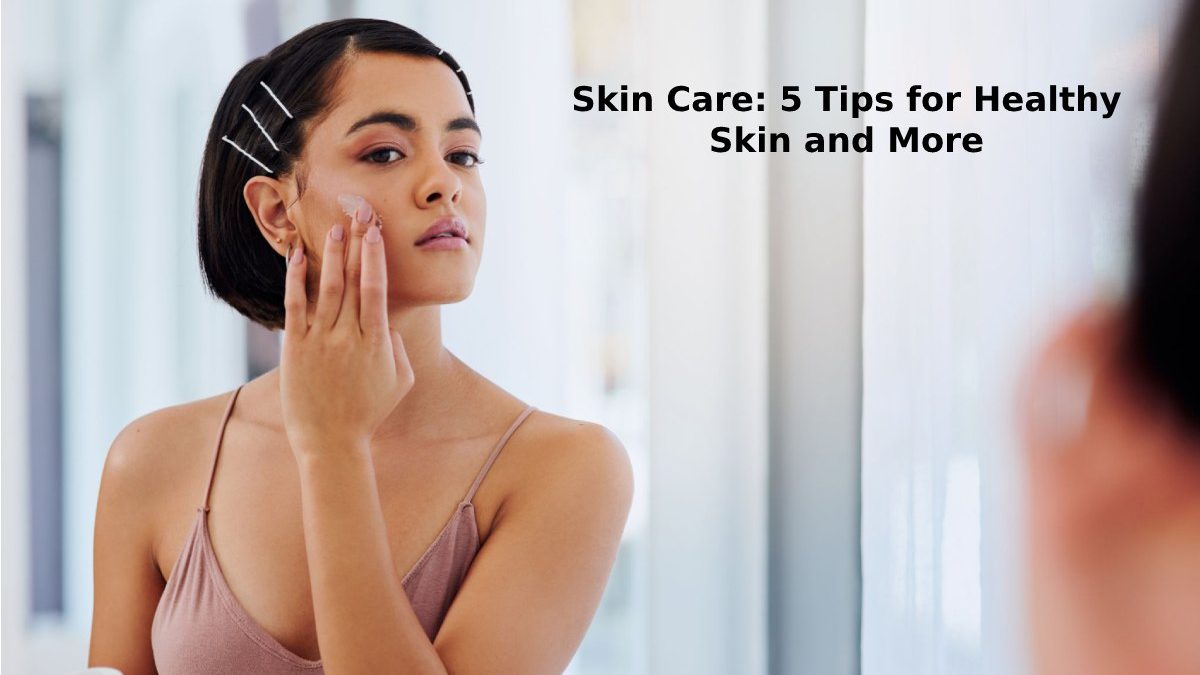Table of Contents
Skin Care
The good skin care, such as sun protection and gentle cleansing, can keep skin healthy and radiant. Don’t have time for intensive skincare? You can still pamper yourself by following the essentials. Good skincare and healthy lifestyle selections can help slow natural ageing and prevent skin problems. Start with these five sensible tips.
Tips for Healthy Skin
1. Protect yourself from the sun

One of the most significant ways to care for your skin is to defend it from the sun. A period of sun exposure can lead to wrinkles, age spots, other skin problems, and an increased risk of skin cancer.
For complete sun protection:
- Use sunscreen: Use broad-spectrum sunscreen with an SPF of at least 15. Put on plenty of sunscreens, and reapply every two hours or more often if you’re swimming or sweating.
- Look for shady places: Avoid the sun between 10 a.m. and 4 p.m., when the sun’s rays are most brutal.
- Wear protective clothing: Protect your skin by wearing a close-fitting, long-sleeved dress, long pants, and wide-brimmed hats. Also, consider laundry products that can provide clothing with an extra layer of UV protection for a set number of washes or special sun protection garments specially designed to block UV rays.
2. Don’t Smoke
Smoking gives your skin an aged appearance and contributes to the formation of wrinkles. In addition, smoking narrows the small blood vessels in the upper layers of the skin, decreasing blood flow and making the skin appear paler. It also removes oxygen and nutrients that are important for good skin health.
Smoking also damages collagen and elastin, the fibres that give skin power and elasticity. Also, the daily facial expressions you make when you smoke, such as pursing your lips when you inhale and squinting when you exhale, can reduce wrinkling.
In addition, smoking increases the risk of squamous cell carcinoma. If you smoke, quitting is the best way to protect your skin. Ask your doctor for advice or treatment to help you quit smoking.
3. Treat your Skin Gently
Daily cleaning and shaving can hurt your skin. To treat it gently:
- Limit the duration of the bath: Hot water and lengthy showers or baths remove natural oils from the skin. Limit the length of your soak or shower, and use lukewarm water instead of hot water.
- Avoid strong soaps: Strong soaps and detergents can remove natural oils from the skin. Instead, use gentle cleansers.
- Shave carefully: To keep and lubricate your skin, apply shaving cream, lotion, or gel before shaving. For a closer shave, use a clean, sharp razor. Shave in the way the hair grows, not against the grain.
- Pat dry: After washing or bathing, gently pat your skin dry with a towel to retain some moisture on your skin.
- Moisturizes dry skin: If you have dry skin, use a moisturizer that get-ups your skin type. For everyday use, consider a moisturizer that covers sun protection factors.
4. Eat a Healthy Diet
A healthy diet can support you to look and feel better. Eat sufficient fruits, vegetables, whole grains, and lean protein. The association between diet and acne is unclear. Still, some research suggests that a diet high in fish oil or fish oil supplements and low in unhealthy fats and processed or refined carbohydrates may promote younger-looking skin. In addition, drinking plenty of water helps keep the skin hydrated.
5. Manage Stress
When Stress is out of control, skin can become more sensitive, triggering breakouts and other skin problems. To help healthy skin and a healthy mood, take steps to manage Stress. Get enough sleep, set reasonable limits, cut your to-do list, and find time to do what you enjoy. The marks could be more significant than you expect.
Why does the Skin Need Protection?
The skin works hard to protect our body, but the forces to which it is subjected can impact its condition and impair its natural defences. As a result, it can negatively affect our health as we become more prone to injuries and infections. Products containing dexpanthenol help to enhance the skin’s protective barrier.
The skin can become dry, sensitive, and irritable when its protective barrier is compromised. As a result, it affects its appearance and the sensations it causes and can negatively influence our self-esteem.
Careful skincare habits and using products containing dexpanthenol can help protect the skin, enhance its protective barrier and make it easier to protect us. Selecting the right skincare product can also prevent premature ageing.
What Factors Influence the Skin?
Many of the external factors from which the skin protects us have, in turn, an impact on it. Exposure to UVA rays, changes in climate and temperature, and the use of chemicals in the workplace, or aggressive cleaning products at home, can overwhelm our skin’s natural neutralizing capacity, damaging its ability to bind moisture and weaken its effectiveness as a protective barrier. As an result, the skin can become dry, sensitized and prone to diseases such as atopic dermatitis. Too frequent washing with too hot water can also cause the skin to dry out, damaging its permeability barrier and triggering problems.
An unbalanced diet, little or no exercise, Stress, lack of sleep, smoking, dehydration and certain medications are other factors that influence the skin and negatively affect its ability to act as a protective barrier.
Conclusion
It protects the organism from external factors such as bacteria, chemical chemistry and temperament. In addition, the pimples contain secrets that can destroy bacteria and melanin, a chemical pigment that serves as a defence against the ultraviolet rays that can cause spots on the skin.

